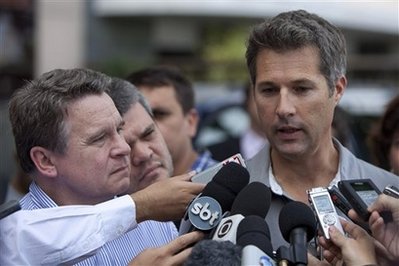Associated Press
December 22, 2009
RIO DE JANEIRO — Brazil’s chief justice [Gilmar Mendes] ruled in favor of a U.S. man who has waged a five-year legal battle for his son, ordering Brazilian relatives on Tuesday to turn over the 9-year-old boy.
The decision put David Goldman one step closer to finally being reunited with his son, Sean, and appeared to bring the case in line with international custody accords.
The boy was taken by Goldman’s now-deceased ex-wife to her native Brazil in 2004, where he has remained. Goldman, of Tinton Falls, New Jersey, has been fighting to get him back from the boy’s stepfather.
Both the U.S. and Brazilian governments have said the matter clearly fell under the Hague Convention, which seeks to ensure that custody decisions are made by the courts in the country where a child originally lived – in this case, the United States.
Goldman’s New Jersey-based lawyer, Patricia Apy, said Tuesday that she believed the order by Supreme Court Chief Justice Gilmar Mendes required Sean to be handed over immediately, but she said Goldman’s attorneys had not heard from lawyers for the Brazilian family.
Lawyers on both sides have said there was still a chance for the Brazilian family to appeal to Brazil’s highest appeals court, though the chances of success seemed slight.
Goldman declined to comment until he learned more details about the 50-page ruling. Calls to the Brazilian family’s lawyer were not returned.
U.S. Rep. Chris Smith, a Republican New Jersey congressman who traveled to Brazil to offer his support, said Goldman was pleased.
“He was elated, a big smile came to his face, but he said ‘I’m not going to let my guard down until it’s wheels up,’” Smith said.

U.S. Rep. Chris Smith speaks to members of the media in Rio de Janeiro, Thursday, Dec. 17, 2009. Smith has been supportive of David Goldman’s fight. Goldman, a father who is having a legal fight to regain custody of his 9-year-old son living in Brazil with his grandparents after his Brazilian mother died, hopes to bring the boy to New Jersey in time for Christmas. Brazil’s Supreme Court on Thursday delayed the return of the boy to his father. (AP Photo/Felipe Dana)
Goldman launched his case in U.S. and Brazilian courts after Sean was taken by his mother to Brazil, where she then divorced Goldman and remarried. She died last year in childbirth, and the boy has lived with his stepfather since.
A lawyer specializing in the Hague Convention said Tuesday’s decision by Mendes was the only right one to make.
“It would be virtually impossible to reconcile international law with a ruling in favor of the Brazilian family,” said Greg Lewen of the Miami-based law firm Fowler White Burnett.
He said that if the Hague Convention were not followed by the chief justice, “the State Department should immediately issue a travel advisory warning parents not to go to Brazil with their children.”
Smith, the congressman, said the fact that the Brazilian chief justice ruled Sean should be with his father would take the steam out of any appeal from the stepfather, himself a lawyer from a prominent family of Rio de Janeiro attorneys.
During a teleconference with U.S. journalists late Tuesday, Smith said law enforcement was on guard in case the Brazilian family did not transfer Sean. He said the international police agency Interpol had been notified to make sure Sean was not flown out of Brazil.
“Our hope is, given the prominence of this family in legal circles, that’s less likely to happen,” Smith said.
Silvana Bianchi, Sean’s maternal grandmother, wrote an open letter to Brazilian President Luiz Inacio Lula da Silva just hours before the Tuesday ruling, in which she said cultural differences and international pressure were driving the case.
“Our moral foundation values the mother’s role. In the absence of the mother, the raising should be done by the grandmother,” she wrote. “That’s how it’s done in Brazil, from north to south, regardless of race, religion or social class. It’s natural that foreigners, with a different foundation, would not understand these authentically Brazilian feelings.”
Meanwhile, Goldman has said his parents and other relatives have been waiting for years to be reunited with Sean.
President Lula da Silva has said that he would not intervene in the case, that it was purely a matter for Brazil’s legal system.
Goldman said on Sunday he would allow Sean’s Brazilian relatives to visit with his son if he won: “I will not do to them what they’ve done to Sean and me.”
The case has affected diplomatic ties between Brazil and the United States, as the U.S. State Department applied pressure for the boy to be returned. President Barack Obama and Lula have discussed the matter.

David Goldman, right, of New jersey, talks to the press as US Representative Chris Smith (R-NJ) looks on in Rio de Janeiro, Friday, Dec. 18, 2009. Goldman is fighting for custody of his 9-year-old son and has asked Brazil’s attorney general to join his battle before the nation’s Supreme Court. Goldman’s son Sean was taken to Brazil in 2004 by his then-wife Bruna Bianchi, who divorced Goldman and remarried before dying while giving birth to a daughter in 2008. (AP Photo/Felipe Dana)
Last week, U.S. Sen. Frank Lautenberg of New Jersey reacted to the case by blocking renewal of a $2.75 billion trade deal that would remove U.S. tariffs on some Brazilian goods. He lifted the hold after Tuesday’s ruling and the U.S. Senate quickly passed the trade measure.
The chief justice’s ruling rendered invalid an earlier stay on a lower court decision ordering Sean be turned over to his father.
The Brazilian family’s lawyer, Sergio Tostes, recently said that he would like to see a negotiated settlement, noting that he wanted to end the damage being done to Sean and to U.S.-Brazil relations.
Goldman said negotiations were out of the question.
“This isn’t about a shared custody – I’m his dad, I’m his only parent,” Goldman said. “This isn’t a custody case – it’s an abduction case.”
___
Associated Press writers Geoff Mulvihill in Mount Laurel, New Jersey, Tales Azzoni in Sao Paulo and AP Television News producer Flora Charner contributed to this report.